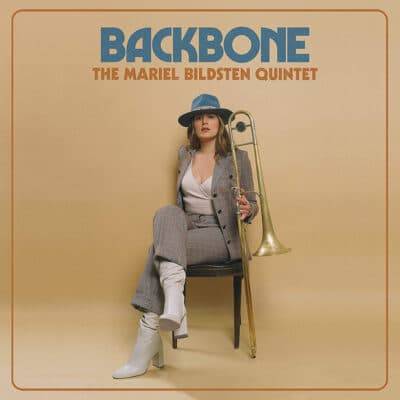The Mariel Bildsten Quintet Backbone
The Mariel Bildsten Quintet
Backbone
Outside in Music
Maybe you are guessing that this is a debut and if so, you’re right. However, trombonist Mariel Bildsten has considerable side-woman experience and plays in several big bands, notably as the lead trombonist in Arturo O’Farrill’s Afro-Latin Jazz Orchestra. She also plays in the Eyal Vilner Big Band, Nation Beat, and she tours internationally with the rock band Brass Against. Her own groups, ranging from duo to septet, have headlined jazz festivals, played around the USA, and gig regularly in New York City. Backbone is her first recording as a bandleader for the lauded trombonist.
Bilsten made sure she had a crack unit to mark this momentous debut, calling on some of the city’s best with Stacy Dillard (saxophones), Sean Mason (piano), Ben Wolfe (bass) and Evan Sherman (drums, co-producer) as well as guest percussionist Keisel Jimenez. Bildsten presents her unique interpretations of classic gems, in an album that weighs in at a brief 30 minutes or so across six compositions with dynamic rearrangements of compositions from Horace Silver, Kenny Dorham, Duke Ellington, Peter De Rose and Bert Shefter.
Horace Silver’s “Ecaroh” brings some fire from the outset with solos from Bildsten, Stacy Dillard on soprano saxophone and pianist Sean Mason. The track’s intro and outro sections were derived from the legendary pianist’s original solo. Harold Arlen’s “The Man That Got Away” is a torch song, published in 1953 and written for the 1954 version of the film A Star Is Born with lyrics by Ira Gershwin. In 1955, it was nominated for the Academy Award for Best Original Song. Of course, this is an instrumental version with Bildsten leading with her robust, sultry tone. In fact, it’s the bluesy, seductive style that imbues most of this music that forms the salient listening impression.
Another film derived track is the stand-out “Rosita”, originally written for the 1923 Ernst Lubitsch-directed silent film of the same name. Although composed by Paul Dupont, with lyrics by Allan Stuart, it was the 1959 take by Coleman Hawkins and Ben Webster that first captured Bildsten’s attention. Rosita, the film, tells the dramatic story of a Spanish street performer named Rosita (played by Mary Pickford), who writes songs in which she insults the king. In the process of chastising her, the king falls in love with Rosita and, feeling threatened, arrests and attempts to execute her lover. The film reveals a complicated love triangle between peasant woman, king, and lover. Inspired by the tale’s telling of the king’s seduction upon Rosita’s first visit to the castle. Bildsten treats listeners to a seductive bolero, as Stacy Dillard on tenor proves to be Bildsten’s kindred spirit in style.
Kenny Dorham’s “Monaco” swings with great turns from the leader, some drum breaks from Sherman, a twisting tenor solo from Dillard, a piano excursion from Mason, and insistent rhythm from Wolfe. “Mood Indigo” settles into the requisite mood beginning with Wolfe’s plucking, setting the stage for a Bildsten’s muted trombone which holds sway throughout. “The Lamp is Low,” originally written by Peter DeRose and Bert Shefter, closes. Paying homage to the fact that this composition was adapted from Maurice Ravel’s “Pavane,” Bilsten wrote an intro section, based on Ravel’s melody. Featuring Cuban percussionist Keisel Jimenez on conga and guiro, this Latin rearrangement leaves listeners uplifted and cheerful with its cha-cha-cha ending. Of note, Bildsten first heard this composition in a typical late-night NYC setting – a performance by the late, great Roy Hargrove at Small’s Jazz Club on a Tuesday morning at 3 am.
Maybe next time out, we’ll hear some originals too. In the meantime, the trombonist, who is inspired by the likes of J.J. Johnson, Curtis Fuller, and Lawrence Brown, elaborates: “I’m imagining taking the subway and bopping my head to ‘Ecaroh,’ ‘The Man Who Got Away,’ and ‘Monaco,’ unwinding after a long day with someone I love to ‘Mood Indigo’ and ‘Rosita,’ and throwing open the windows on a bright sunny day and dancing to ‘The Lamp is Low.” This ensemble collectively displays an exuberant spirit, whether it be swing, dance or romance. Hopefully, this is just the start.
- Jim Hynes
Buy Us a Cup of Coffee!
Join the movement in supporting Making a Scene, the premier independent resource for both emerging musicians and the dedicated fans who champion them.
We showcase this vibrant community that celebrates the raw talent and creative spirit driving the music industry forward. From insightful articles and in-depth interviews to exclusive content and insider tips, Making a Scene empowers artists to thrive and fans to discover their next favorite sound.
Together, let’s amplify the voices of independent musicians and forge unforgettable connections through the power of music
Make a one-time donation
Make a monthly donation
Make a yearly donation
Buy us a cup of Coffee!
Or enter a custom amount
Your contribution is appreciated.
Your contribution is appreciated.
Your contribution is appreciated.
DonateDonate monthlyDonate yearlyYou can donate directly through Paypal!
Subscribe to Our Newsletter
Discover more from Making A Scene!
Subscribe to get the latest posts sent to your email.















































